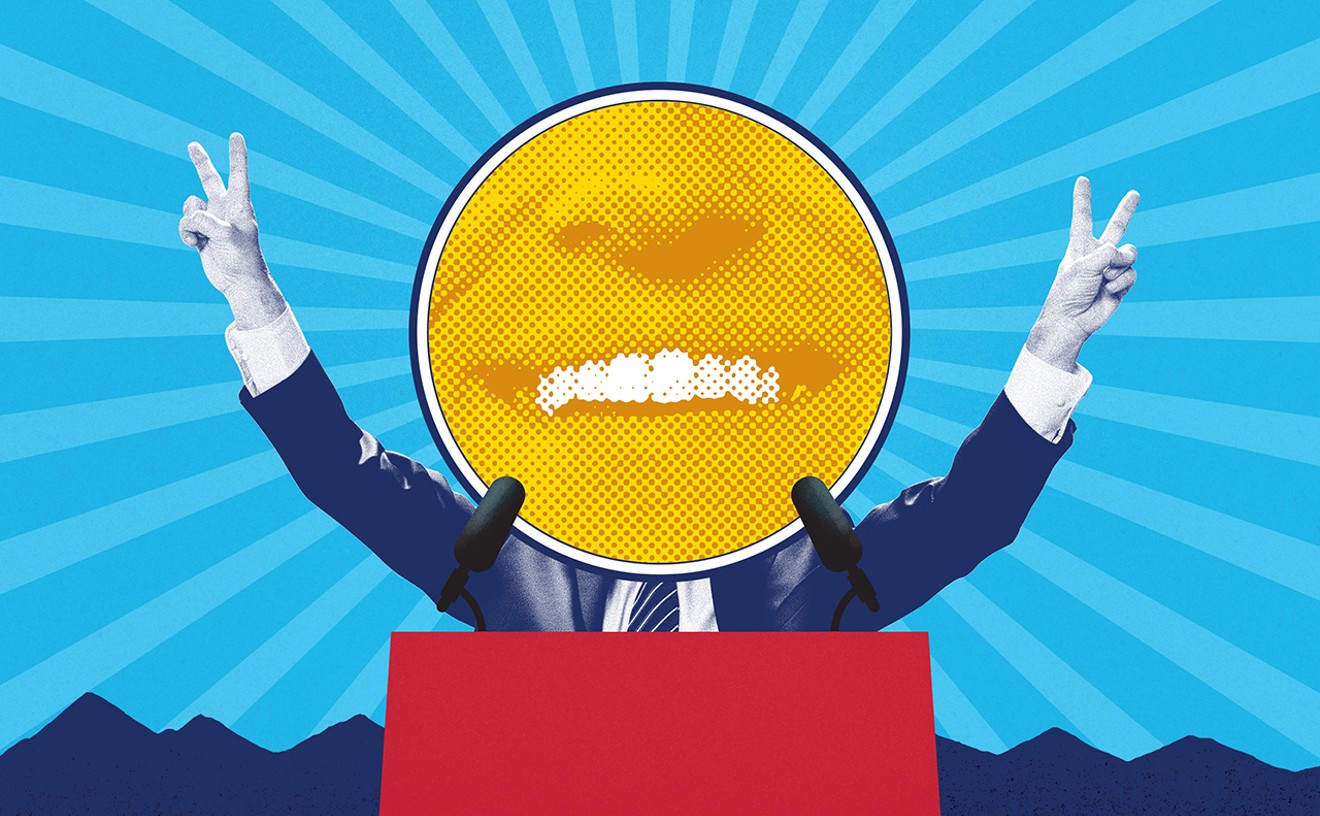See also: A Century and a Half Later, the Wounds of Sand Creek Are Still Fresh
And last week, fourteen months after the members of the committee -- comprising academics, students and alumni, outside historians and descendants of those killed at Sand Creek -- first convened, they released a report that concluded "John Evans's pattern of neglect of his treaty-negotiating duties, his leadership failures, and his reckless decision-making in 1864 combine to clearly demonstrate a significant level of culpability for the Sand Creek Massacre."
That was the horrific event on November 29, 1864, when Colonel John Chivington -- co-founder of the Colorado Seminary and not just an ardent Methodist like Evans, but an actual minister -- led more than 600 troops, including regular Army officer and volunteers with the Third Colorado Calvary, previously known as the "Bloodless Third," in a very bloody raid on a peaceful camp of Arapaho and Cheyenne camped along Sand Creek -- where the tribes had been told to go by U.S. Army officers stationed at Fort Lyons. Where they were told they'd be safe. Instead, at least 150 members of the tribes, most of them women, children and the elderly, were brutally murdered. "While not of the same character, Evans's culpability is comparable in degree to that of Colonel John Chivington, the military commander who personally planned and carried out the massacre," the committee determined. "Evans's actions and influence, more than those of any other political official in Colorado Territory, created the conditions in which the massacre was highly likely."And over the next hundred pages, the committee members stated their case, showing how Evans whipped up hysteria over non-existent raids, begged the Army for another 100 men to combat "these infernal Indians," issued a June 14, 1864, proclamation to "the friendly Indians of the Plains" that "comes close to being an official declaration of war," the committee notes -- and then issued a second proclamation on August 11, 1864, that came even closer, at the same time that the "friendly Indians" were being stymied in their attempts to comply with the first proclamation. They compare Evans's actions to those of his colleagues in Utah and Nevada, who were able to negotiate peacefully with the Indians in their territories. And they compare their findings to a report issued in May by Northwestern University, which had been founded by Evans in 1850, and took its own, not-as-hard look at Evans's legacy.
The DU committee is not the first to find fault with Evans; three federal investigations conducted in the wake of Sand Creek determined that the action was indeed a massacre and President Andrew Johnson called for Evans's resignation. But this is the first critical report issued by people working in the shadow of a mountain commemorating John Evans, along a street named for him, at an institution where the highest honor is to be a John Evans Professor...even if current John Evans Professor Alan Gilbert, who served on the committee, is one of his harshest critics.And the committee did not stop its work after finding Evans culpable. The members went on to offer 22 recommendations for how DU can "be a change leader illuminating a new path forward: a path of unity, collaboration, and healing for all communities." Among the possible steps on that path would be creating forums to discuss possible renaming of campus buildings, positions and awards, "without historical erasure."
Forgetting history is not fixing it. In the late '90s, there was a proposal to remove a line on the Civil War Monument at the State Capitol -- which lists Sand Creek as a battle in that war. Rather than allow history to be erased, tribal representatives and historians worked together to persuade legislators to instead add a second plaque to the monument in 2002, one that suggests "the controversy surrounding this Civil War monument has become a symbol of Coloradans' struggle to understand and take responsibility for our past."A dozen years later, as a change.org petition was pushing to rename the town of Chivington, once a bustling burg outside of Eads that today is a ghost town, members of the Sand Creek Massacre Commemoration Commission were meeting just a few miles away at the Sand Creek Massacre National Historic Site. The Chivington name change concept came up, and the tribal representatives were unanimous in the belief that the name should stay. "It was helpful to hear the tribes talk about that," says Nancy Wadsworth, an associate professor in DU's Department of Political Science who pushed the university's report through.
The Evans name and legacy are a burden that DU will have to bear. "We could have sidestepped the issue of culpability, but it felt like that would have been dishonest," says Wadsworth. "We tried to be courageous here."
And they were: They got a tough job done at the same time that the university's attempts to settle a sticky mascot issue have stalled; they issued their report criticizing DU's founder the same year the school is celebrating its sesquicentennial; they shouldered a heavy historic burden that is impossible to deny.
Send tips to [email protected].











